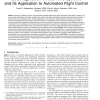Free Online Productivity Tools
i2Speak
i2Symbol
i2OCR
iTex2Img
iWeb2Print
iWeb2Shot
i2Type
iPdf2Split
iPdf2Merge
i2Bopomofo
i2Arabic
i2Style
i2Image
i2PDF
iLatex2Rtf
Sci2ools
152
click to vote
RTAS
1997
IEEE
1997
IEEE
QoS Negotiation in Real-Time Systems and Its Application to Automated Flight Control
ÐReal-time middleware services must guarantee predictable performance under specified load and failure conditions, and ensure graceful degradation when these conditions are violated. Guaranteed predictable performance typically entails reservation of resources and use of admission control. Graceful degradation, on the other hand, requires dynamic reallocation of resources to maximize the application-perceived system utility while coping with unanticipated overload and failures. We propose a model for quality-of-service (QoS) negotiation in building real-time services to meet both of the above requirements. QoS negotiation is shown to 1) outperform ªbinaryº admission control schemes (either guaranteeing the required QoS or rejecting the service request), 2) achieve higher application-perceived system utility, and 3) deal with violations of the load and failure hypotheses. We incorporated the proposed QoS-negotiation model into an example real-time middleware service, called RTPOOL, w...
Related Content
| Added | 06 Aug 2010 |
| Updated | 06 Aug 2010 |
| Type | Conference |
| Year | 1997 |
| Where | RTAS |
| Authors | Tarek F. Abdelzaher, Ella M. Atkins, Kang G. Shin |
Comments (0)

